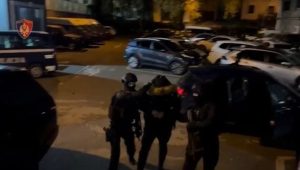06.07.2021 – 08:19
By Andreas Fulda, The Spectator
The Chinese Communist Party celebrated its 100th anniversary earlier this month with a powerful statement full of confidence. What started life as a branch of the Soviet Comintern with only 50 members, now has over 95 million such.
The imperial rule of the Communist Party has been going on since the founding of the People’s Republic of China in 1949. From the self-confidence displayed in the celebrations of these days, it was quite clear that the domination of the PKK would not end so soon.
Secretary-General Xi Jinping used warlike tones in his keynote address when he addressed a large crowd in Tiananmen Square last Thursday. Dressed in a gray suit alla-Mao Ce Dun, he warned all those “who think they have the right to give us lectures”.
According to him, the PKK will never allow anyone to “Harass, oppress or subjugate China”, and those who will attempt to do so “They will break their heads in front of a huge steel wall, built with the flesh and blood of more than 1.4 billion Chinese.”.
Xi’s belief in the history and destiny of the PKK is unwavering. But the rhetoric about China’s history, which supports this propaganda campaign, was not limited to Beijing. It also spread to the West. Professor Henry Shang, the leader of a Chinese think tank, told the BBC’s Today program on Monday that he “did not quite agree” with the claim that Mao was a mass murderer.
For Wang, the deaths of tens of millions inextricably linked to Mao’s name in the West could be considered a “natural disaster.” And it was not necessary to ask what his sources were. As Wang told astonished listeners, “there is a party document on Mao’s achievements and mistakes.”
His statement was not surprising. In President Xi’s China, there is a party document for everything. The PKK uses these documents to print all narratives other than the official one.
A year after Xi took office as General Secretary of the PKK in 2013, the censorship instruction, otherwise known as Document No. 9, was unveiled. This document was drafted to impede the independence of the media and the judiciary.
Among the long list of taboo topics was the questioning of the party’s official historiography. George Orwell wrote in his book “1984” that he who controls the past, controls the future. Like Big Brother, the PKK knows that the greatest threat to a communist state is the challenge to the historical narrative on which its authority is based.
Document No. 9 is a prime example, as it claims that independent scholars have engaged in “a historical nihilism towards party history and the history of New China.”
According to him, only official history is acceptable.
And in fact, the PKK has strong reasons to be afraid of reaping its history. Zhang Zhenglong, a former People’s Liberation Army officer who was involved in PKK battles in Northeast China, documented China’s bloody civil war in his 600-page study entitled “White Snow, Red Blood.”
There he described the siege of Changchun in 1948 by the communist army, which brought about the starvation death of some 150,000 people. According to Zhang “Changchun was like Hiroshima, as the death toll was almost the same, and while the explosion in Hiroshima lasted only 9 seconds; the drama in Changchun lasted 5 months ”.
But the PKK’s fear extends beyond the violence of its military. After the founding of the People’s Republic of China, Mao launched a campaign against the “right” in 1957-1959, in which the culprits’ crime was criticism of the party. About 550,000 people died during that campaign; many more later died in prisons, labor camps, etc.
Strict political censorship and blind worship of Mao exacerbated PKK policy failures. Chaotic attempts to overtake Britain devastated the country’s agricultural sector. Putting steel production ahead of harvest increases killed at least 45 million people during the Mao Grand Prix in 1958-1962.
Another 2.5 million died from torture or executions. The PKK extended its bloody record to foreign affairs. In 1950, Mao intervened in the Korean War to support the totalitarian regime of Kim Il-sung. About 900,000 Chinese soldiers are thought to have lost their lives in a war that plunged them into a stalemate for 3 years.
Meanwhile, the continued exile of the Dalai Lama, shows that the oppression of Tibetan linguistic, cultural and religious traditions that began under Mao in 1959, has continued to this day. But it was the Cultural Revolution (1966-1976) that almost destroyed the social structure of the country.
During its most radical phase (1966-1969), mainland China was on the brink of another civil war. Prompted by Mao’s wife, Jiang Qing, the Red Guard became so aggressive that in 1968, Mao was forced to mobilize the army to suppress the guards.
Mao died leaving behind a divided China, with a central state whose authority had been dangerously damaged, and a very young population radicalized by his revolutionary enthusiasm. In the mid-1980s, Deng Xiaoping continued to rely on the tough police state strategies to keep Chinese society under control.
He authorized the so-called “Strong blows”, which ostensibly aimed at organized crime, but in reality hit the political opponents of the Communist Party rule. In less than 3 years, about 10,000 people were executed.
In 1989, Deng made the fatal decision to crack down on the nationwide pro-democracy movement in Tiananmen Square. Reliable estimates of those killed that day range from 2,700 to 10,000 people. The tragedy of China, has been the usual failure to think about a permanent liberalization of governance.
It is true that China’s membership in the WTO in 2001 brought about a phase of easing government control over the economy. Also the early 2000s brought a brief period of greater political freedom under President Hu Jintao.
But since 2012, Xi has re-established the PKK’s draconian control over Chinese citizens. The party has acted on several fronts to curb the independence of various communities within China. More than 1 million Uighurs are currently being held in re-education or labor camps.
The democratic aspirations of millions of Hong Kong residents have been violated by the illiberal National Security Act. In January 2019, Xi reserved his right to use force against Taiwan. This approach comes along with the continued use of torture, censorship and social conditioning in China.
But the splendor of the 100th anniversary celebrations hides an instability felt by the party leadership. The main obstacle to any kind of liberalization by the PKK is its bloody history.
Exposing her past would mean highlighting not only her endless crimes against humanity, but her constant abuse of her own people. As long as the Chinese Communist Party is in power, there can be no hope for a Chinese version of the Peace and Reconciliation Commission like the one in post-apartheid South Africa.
So a party anxious to retain its power is bound to continue to hide its historical mistakes from its people.
For any Chinese citizen who has seen the real brutality of PKK rule, Xi’s statement that “people are the real heroes, because they are the ones who made history” must have sounded as hurtful as it’s empty. The sad truth is that the future of the PKK seems to be in line with its past, a permanent desecration of human dignity.




